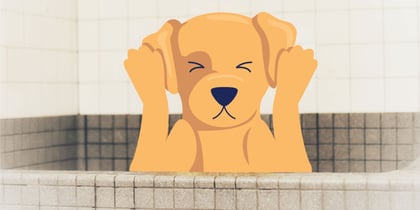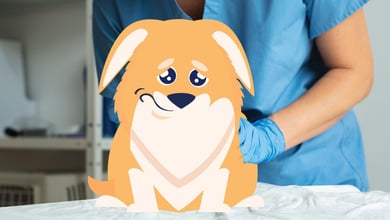Giardia in Dogs: Symptoms, Causes, & Treatment

Table of Contents
Giardia is a common parasitic infection that can affect our furry companions. Understanding the symptoms, causes, and treatment of giardia is crucial for the well-being of our dogs. This pesky parasite can cause digestive issues and discomfort, leading to dehydration and weight loss if left untreated.
By familiarizing ourselves with Giardia in dogs and taking proactive steps to protect them, we ensure their health and happiness and minimize the risk of transmission to humans, creating a safer environment for our entire family.
Key Takeaways:
- Giardia is a common parasitic infection in dogs that can cause digestive issues and discomfort.
- The infection is caused by ingesting contaminated water or coming into contact with infected feces.
- Treatment involves medications prescribed by a veterinarian, such as metronidazole and fenbendazole.
What is Giardia in Dogs?
Giardia, a microscopic protozoan parasite, is responsible for a common infection in dogs. It has two forms: trophozoites and cysts. Trophozoites, the active stage with whip-like appendages called flagella, attach to the small intestine, causing inflammation and symptoms like diarrhea.
Some trophozoites transform into cysts, which are passed in the dog's feces and act as an infectious stage. When other mammals, including dogs, ingest these cysts, they can develop giardiasis, the disease caused by Giardia.
Signs & Symptoms of Giardia in Dogs
Giardia infection in dogs can manifest with a range of symptoms, including:
- Diarrhea
- Vomiting
- Excess foul-smelling gas
- Decreased appetite
- Weight loss
- Reduced energy levels
- Frequent urges to defecate
Some infected dogs may not exhibit any symptoms (subclinical infection), as routine testing for giardia in healthy dogs is uncommon. Practicing good hygiene when handling animal feces is crucial to prevent the transmission of Giardia, as even asymptomatic dogs can carry the parasite.
Causes of Giardia in Dogs
Giardia can be caused by various factors, primarily from ingesting contaminated water and contact with infected feces.
Contaminated water sources, such as stagnant ponds or contaminated drinking water, can harbor the infectious cysts of giardia. When dogs drink or swim in these contaminated water sources, they can unintentionally consume the cysts, leading to infection.
Additionally, direct contact with infected feces, whether from other dogs or contaminated environments, poses a significant risk of transmission. Dogs may come into contact with feces during walks or while playing outdoors, where contaminated soil, plants, or grass can also be potential sources of infection. Sniffing other dogs' hind ends, a common behavior during greetings can further contribute to the transmission of the parasite.
Dog owners must be aware of these potential sources of infection and take proactive measures to prevent their dogs from coming into contact with contaminated water or feces.
Diagnosing Giardia in Dogs
Diagnosing dogs with giardia typically involves fecal tests, including direct smear and antigen tests, to confirm the presence of the parasite.
A direct smear involves examining a fecal sample under a microscope to detect the presence of giardia cysts.
Antigen tests are another commonly used method that detects specific giardia proteins in the feces.
It's important to note that the shedding of giardia cysts can be intermittent, meaning that a single test may not always yield accurate results. To increase the chances of detection, multiple fecal tests should be performed on different days to capture any intermittent shedding and improve the accuracy of the diagnosis.
Treatment for Dogs with Giardia
Giardia is commonly treated with medications prescribed by veterinarians, such as metronidazole and fenbendazole. Metronidazole is an antibiotic that targets the parasite and helps eliminate the infection. Fenbendazole, an anthelmintic medication, is also effective against giardia.
Following the veterinarian's instructions on dosage and treatment duration is crucial. Completing the full course of treatment is crucial to ensure the eradication of the parasite and prevent reinfection. Even if the symptoms improve before the treatment is complete, it is essential to continue giving the medication as prescribed.
In addition to medication, maintaining proper hydration and a balanced diet may be recommended.
Regular follow-up visits to the veterinarian are important to monitor the dog's progress and ensure the success of the treatment.
Prevention and Control of Giardia
The following measures protect your dog and help safeguard other animals, including humans, and reduce the chances of reinfection.
Avoid contaminated water sources
Prevent your dog from drinking water from stagnant ponds, lakes, or streams that may harbor giardia cysts. Opt for clean, fresh water sources, such as tap or properly filtered water.
Practice proper waste disposal
Promptly clean up and dispose of your dog's feces at home and in public areas. Giardia cysts can be present in infected feces, so proper waste management is essential to prevent transmission.
Maintain cleanliness in living areas
Regularly clean and disinfect your dog's living spaces, including bedding, toys, and food bowls. Giardia cysts can survive in the environment, so maintaining cleanliness helps minimize the risk of exposure.
Practice good hygiene
Wash your hands thoroughly with soap and water after handling your dog, especially after cleaning up feces or coming into contact with potentially contaminated areas. This helps prevent the spread of giardia and other pathogens.
Avoid contact with infected animals
Limit your dog's interactions with animals known or suspected to have giardia infection. This includes avoiding close contact, sharing water bowls, or allowing nose-to-nose greetings, as these behaviors can contribute to transmission.
Home Remedies and Alternative Treatments
While various home remedies and alternative treatments may be suggested for giardia, it is important to approach them with caution and consult a veterinarian for guidance.
Probiotics, such as yogurt or kefir, are believed to promote a healthy gut flora. Herbal remedies like goldenseal or grapefruit seed extract are also sometimes recommended for their potential antimicrobial properties. Additionally, dietary modifications, such as a bland or high-fiber diet, may be suggested to support gastrointestinal health.
However, it is crucial to note that the effectiveness of these home remedies in treating giardia has not been scientifically proven. Relying solely on home remedies without professional supervision may delay proper diagnosis and appropriate treatment. Consulting a veterinarian ensures your dog receives the most effective and evidence-based care for giardia infection.
Conclusion
Giardia in dogs is a concerning and contagious infection caused by contaminated water and feces. It can lead to troublesome symptoms like diarrhea, vomiting, weight loss, and lethargy. Early detection, proper treatment, and preventive measures are essential not only for your dog's health but also to protect other pets and humans.
Don't forget to schedule a visit with a veterinarian for an accurate diagnosis and a tailored treatment plan. Your dog's well-being and the well-being of those around them are of utmost importance!
Frequently Asked Questions
How long does giardia in dogs last?
Giardia in dogs can last until effectively treated and removed from the environment. It typically takes a couple of weeks of treatment and strict environmental management to clear the disease. Multiple negative tests are often needed to confirm resolution.
Is giardia contagious in dogs?
Yes, giardia is contagious in dogs. It can be transmitted through direct contact with infected feces or contaminated environments. Other dogs and even humans can become infected if they come into contact with the parasite.
How common is giardia in dogs?
Giardia is relatively common in dogs, particularly in environments where hygiene and sanitation practices may be lacking. Regular check-ups, proper hygiene, and preventive measures can help minimize the risk of giardia infection in dogs.
Can giardia kill dogs?
While giardia infections can cause significant discomfort and health issues in dogs, they are rarely fatal on their own. However, if left untreated or in cases where the dog has a compromised immune system, severe dehydration and malnutrition resulting from prolonged diarrhea can pose serious health risks.
Can cats get giardia from dogs?
Yes, cats can get giardia from dogs. Giardia is a zoonotic parasite, meaning it can infect both animals and humans. The parasite can be transmitted through direct contact with infected feces or contaminated environments.
Can humans get giardia from dogs?
Yes, humans can get giardia from dogs. It is a zoonotic parasite that can be transmitted through contact with infected feces or contaminated areas. Good hygiene practices, such as thorough handwashing, are important to minimize the risk of transmission.
What to feed a dog with giardia?
It's important to provide a balanced and easily digestible diet to help minimize diarrhea. Your veterinarian may recommend a prescription diet or suggest feeding bland foods such as boiled chicken and rice. Refrain from offering table scraps.






